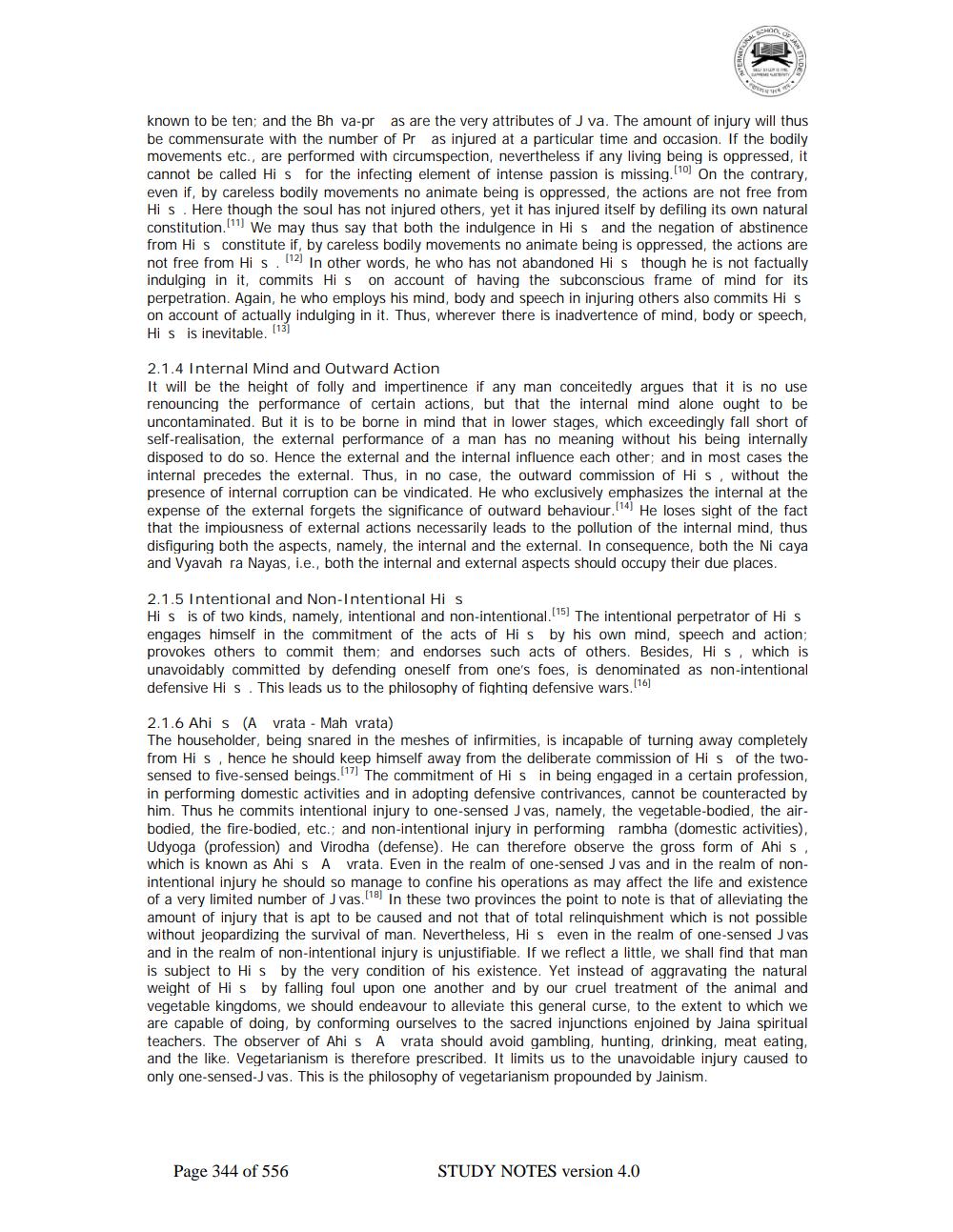________________
known to be ten; and the Bh va-pras are the very attributes of J va. The amount of injury will thus be commensurate with the number of Pras injured at a particular time and occasion. If the bodily movements etc., are performed with circumspection, nevertheless if any living being is oppressed, it cannot be called His for the infecting element of intense passion is missing. On the contrary, even if, by careless bodily movements no animate being is oppressed, the actions are not free from Hi s . Here though the soul has not injured others, yet it has injured itself by defiling its own natural constitution. 11) We may thus say that both the indulgence in His and the negation of abstinence from His constitute if, by careless bodily movements no animate being is oppressed, the actions are not free from His . 112] In other words, he who has not abandoned His though he is not factually indulging in it, commits His on account of having the subconscious frame of mind for its perpetration. Again, he who employs his mind, body and speech in injuring others also commits His on account of actually indulging in it. Thus, wherever there is inadvertence of mind, body or speech, His is inevitable. [13]
2.1.4 Internal Mind and Outward Action It will be the height of folly and impertinence if any man conceitedly argues that it is no use renouncing the performance of certain actions, but that the internal mind alone ought to be uncontaminated. But it is to be borne in mind that in lower stages, which exceedingly fall short of self-realisation, the external performance of a man has no meaning without his being internally disposed to do so. Hence the external and the internal influence each other; and in most cases the internal precedes the external. Thus, in no case, the outward commission of His , without the presence of internal corruption can be vindicated. He who exclusively emphasizes the internal at the expense of the external forgets the significance of outward behaviour." He loses sight of the fact that the impiousness of external actions necessarily leads to the pollution of the internal mind, thus disfiguring both the aspects, namely, the internal and the external. In consequence, both the Ni caya and Vyavah ra Nayas, i.e., both the internal and external aspects should occupy their due places.
2.1.5 Intentional and Non-Intentional His His is of two kinds, namely, intentional and non-intentional. (15) The intentional perpetrator of His engages himself in the commitment of the acts of His by his own mind, speech and action; provokes others to commit them; and endorses such acts of others. Besides, His, which is unavoidably committed by defending oneself from one's foes, is denominated as non-intentional defensive His . This leads us to the philosophy of fighting defensive wars. [16]
2.1.6 Ahi s (A vrata - Mah vrata) The householder, being snared in the meshes of infirmities, is incapable of turning away completely from His , hence he should keep himself away from the deliberate commission of His of the twosensed to five-sensed beings. The commitment of His in being engaged in a certain profession, in performing domestic activities and in adopting defensive contrivances, cannot be counteracted by him. Thus he commits intentional injury to one-sensed J vas, namely, the vegetable-bodied, the airbodied, the fire-bodied, etc.; and non-intentional injury in performing rambha (domestic activities). Udyoga (profession) and Virodha (defense). He can therefore observe the gross form of Ahi s which is known as Ahi s A vrata. Even in the realm of one-sensed J vas and in the realm of nonintentional injury he should so manage to confine his operations as may affect the life and existence of a very limited number of J vas. 18 In these two provinces the point to note is that of alleviating the amount of injury that is apt to be caused and not that of total relinquishment which is not possible without jeopardizing the survival of man. Nevertheless, His even in the realm of one-sensed J vas and in the realm of non-intentional injury is unjustifiable. If we reflect a little, we shall find that man is subject to His by the very condition of his existence. Yet instead of aggravating the natural weight of His by falling foul upon one another and by our cruel treatment of the animal and vegetable kingdoms, we should endeavour to alleviate this general curse, to the extent to which we are capable of doing, by conforming ourselves to the sacred injunctions enjoined by Jaina spiritual teachers. The observer of Ahi s A vrata should avoid gambling, hunting, drinking, meat eating, and the like. Vegetarianism is therefore prescribed. It limits us to the unavoidable injury caused to only one-sensed-J vas. This is the philosophy of vegetarianism propounded by Jainism.
Page 344 of 556
STUDY NOTES version 4.0




